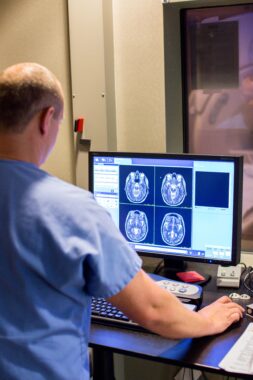When children face health issues like illnesses, sports injuries or potential broken bones, medical imaging becomes a crucial aspect of their care. Our younger patients’ unique needs require the expertise of radiologists who have subspecialized training in pediatric imaging. As a subspecialty of radiology, pediatric radiology uses medical imaging to diagnose illnesses and injuries in babies, children and teenagers, from the premature neonate to the college-bound adolescent.
At Carolinas Imaging Services, our board-certified, subspecialized pediatric radiologists deliver the diagnostic information referring providers need while ensuring children are as safe as possible. When your child needs an imaging scan, trust their care to a skilled expert who is uniquely qualified to care for even the tiniest patients.
What Sets Children’s Imaging Needs Apart?
Due to their smaller size, children are more sensitive to radiation, increasing the risk of side effects. Our team uses advanced equipment to keep their exposure to radiation “as low as reasonably achievable” (the ALARA principle). X-rays and scans are tailored to each child’s size, aiming for clear images with the lowest possible radiation.
Pediatric patients may also need extra emotional support before, during and after imaging scans to relieve feelings of fear or anxiety. Our trained staff recognizes the importance of a gentle approach, patience and setting age-appropriate expectations for cooperation and comfort. With soft lighting, soothing music, play therapy, familiar toys and a close caregiver, we help create a supportive, soothing environment to make your child’s experience as minimally stressful and enjoyable as possible.
Conditions Diagnosed With Pediatric Radiology
Pediatric imaging is an invaluable tool for diagnosing a wide variety of conditions, including:
- Appendicitis
- Broken bones
- Causes of respiratory or abdominal symptoms
- Infections
- Inflammation
- Kidney stones
- Problems with the organs and blood vessels
- Soft tissue injuries, such as muscle strains and tears
- Sports injuries, such as shoulder injuries from baseball
- Traumatic injuries
- Tumors, including cancer
Our pediatric radiologists are available to referring providers to serve as consultants, ensuring your child receives the right exam, for the right reason and using the right modality that will best answer the clinical question at hand.
Different Types of Scans for Children
Countless situations may call for imaging scans in children. Pediatric radiology encompasses the use of many types of imaging, including:
- CT — Clearer than an X-ray, these 3D images can help identify tumors, detect birth defects, confirm a traumatic brain injury, diagnose breathing problems and more.
- MRI — Instead of using radiation, as X-ray and CT scans do, MRI scans use radio waves to create images that can help diagnose conditions of the organs and soft tissue injuries. Carolinas Imaging Services pediatric radiologists operate North Carolina’s first dedicated pediatric MRI unit at Levine Children’s Hospital. Designed with families’ comfort in mind, the MRI unit features a playroom in the reception area and other family-friendly additions.
- Nuclear medicine scans — These scans involve using tiny amounts of radioactive material, which produce minimal radiation exposure, to gauge how well organ systems are functioning. Nuclear medicine scans can help diagnose conditions including tumors, gastrointestinal bleeding and epilepsy.
- Orthopedic injections — These injections can be used as a contrast tool, sometimes in conjunction with MRI, CT or X-ray, to enhance visualization of structures in the evaluation of joints (arthrography). Orthopedic injections can also be used as a therapeutic tool to determine a source of pain and offer lasting relief through minimally invasive procedures like nerve root blocks and facet injections.
- Ultrasound — Using sound waves, ultrasound creates real-time images that can show injuries to organs or soft tissues, detect diseased or damaged tissue, locate abnormal growths and identify conditions.
- X-ray — X-ray scans are useful to help identify problems ranging from soft tissue injuries and joint conditions to tumors and broken bones.
For specialized imaging methods such as CT and MRI, along with specific procedures, children might need to stay still or hold their breath for a short period of time. Depending on your child’s age and size, sedation may be necessary. Our pediatric radiologists work with the referring provider and the Atrium Levine Children’s pediatric anesthesiology team to plan and administer sedation during exams. These plans are organized when scheduling, and all sedated studies take place at the hospital.
A Problem-Solving Subspecialty
Children have different needs than adults. Pediatric radiology includes considerations that aren’t present in adult imaging. Some of the most common challenges pediatric radiology solves include:
- Reducing radiation exposure. Pediatric radiologists take several steps to minimize radiation exposure, including low-dose protocols and iterative reconstruction, a type of algorithm for CT that can reduce radiation dose. In addition, pediatric radiologists use imaging options that don’t produce radiation, such as MRI, when appropriate.
- Soothing children’s anxieties about imaging scans. Technologists know how to interact with younger patients in ways that put them at ease, working with children to relieve their anxieties.
- Tailoring treatments to each child’s unique anatomy. Different from adults in size and anatomy, children need imaging care that accounts for their uniqueness as they grow and their bodies change. Pediatric radiologists adjust their imaging parameters to fit each child’s size and shape.
Experts in Children’s Imaging
All pediatric radiologists at Carolinas Imaging Services are board-certified by the American Board of Radiology, which indicates the highest level of expertise. Pediatric radiologists routinely partner with pediatricians, pediatric anesthesiologists, and other specialists and subspecialists to deliver coordinated care and keep young patients safe.
Pediatric radiologists undergo specialized training for children’s imaging, with four years in diagnostic radiology after medical school, followed by at least a one-year pediatric radiology fellowship. This fellowship includes a subspecialized board certification known as a Certificate of Added Qualification (CAQ). Our dedicated pediatric neuroradiologist, with a two-year fellowship, holds a CAQ in neuroradiology. As the exclusive solution for pediatric imaging at Atrium Health and Carolinas Imaging Services, our Charlotte Radiology team ensures high-quality, evidence-based diagnostic imaging for all pediatric subspecialties, addressing clinical questions effectively.
How Innovation Is Fueling Pediatric Radiology’s Future
As innovation spurs advances in quality and safety, pediatric radiology continues to evolve. Reducing radiation exposure in pediatric imaging is a top priority. That’s why Carolinas Imaging Services participates in Image Gently®, an international group of radiological societies, including the Society of Pediatric Radiology, dedicated to tailoring radiation doses to keep children safe while meeting their imaging needs. They provide resources for major modalities, including CT, MRI, fluoroscopy, nuclear medicine, ultrasound and X-ray.
Image Gently® is just one example of how pediatric radiologists and others are innovating to solve challenges in children’s imaging. Other examples include new image reconstruction techniques for CT and dose tracking software that can help minimize radiation exposure. Our commitment to you is this: to ensure that your child’s exam will yield the necessary information with the least possible risk.
Your Home for Pediatric Radiology
Helping your child starts with finding the right imaging partner. From reducing radiation exposure to putting children at ease, the pediatric imaging specialists at Carolinas Imaging Services have the knowledge and compassion to overcome the many challenges of imaging in children. Accredited by the American Board of Radiology, which helps set safe dosing standards for children, CIS features a team of board-certified pediatric radiologists who will create a safe, comfortable imaging experience for your child.
Looking for a children’s imaging expert to perform a diagnostic scan for your child? Meet the board-certified pediatric radiologists at Carolinas Imaging Services.
Co-authored by Adrienne Bean, MD, pediatric radiologist.



